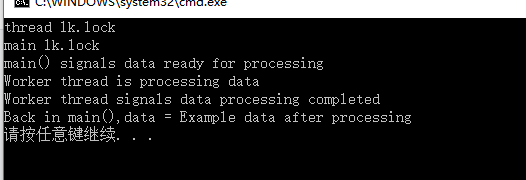| (C++11) |
provides a condition variable associated with a std::unique_lock |
condition_variable
(C ++ 11)
提供与std :: unique_lock关联的条件变量
Example
condition_variable is used in combination with a std::mutex to facilitate inter-thread communication.
例1
condition_variable与std :: mutex结合使用以促进线程间通信。
当 std::condition_variable 对象的某个 wait 函数被调用的时候,它使用 std::unique_lock(通过 std::mutex) 来锁住当前线程。当前线程会一直被阻塞,直到另外一个线程在相同的 std::condition_variable 对象上调用了 notification 函数来唤醒当前线程。
std::condition_variable 对象通常使用 std::unique_lock<std::mutex> 来等待,如果需要使用另外的 lockable 类型,可以使用 std::condition_variable_any 类,本文后面会讲到 std::condition_variable_any 的用法。
// threadTest.cpp : 定义控制台应用程序的入口点。
//
#include "stdafx.h"
#include <iostream>
#include <string>
#include <thread>
#include <mutex>
#include <condition_variable>
#include <chrono>
std::mutex m;
std::condition_variable cv;
std::string data;
bool ready = false;
bool processed = false;
void worker_thread()
{
//std::this_thread::sleep_for(std::chrono::seconds(1));
// wait until main() sends data
std::unique_lock<std::mutex> lk(m);
std::cout << "thread lk.lock\n";
// here m will be unlocked,and will wait other thread notify ,if recive other thread notify,this thread will go on.
cv.wait(lk, [] {return ready; });
// after the wait, we own the lock
std::cout << "Worker thread is processing data\n";
data += " after processing";
// send data back to main()
processed = true;
std::cout << "Worker thread signals data processing completed\n";
// Manual unlocking is done befor nodifying, to avoid waking up
// the waiting thread only to block again (see notify_one for details)
lk.unlock();
cv.notify_one();
}
int main()
{
std::thread worker(worker_thread);
data = "Example data";
// send data to the worker thread
{
std::lock_guard<std::mutex> lk(m);
std::cout << "main lk.lock\n";
ready = true;
std::cout << "main() signals data ready for processing\n";
}
cv.notify_one();
// wait for the worker
{
std::unique_lock<std::mutex> lk(m);
cv.wait(lk, [] {return processed; });
}
std::cout << "Back in main(),data = " << data << '\n';
worker.join();
return 0;
}
运行结果:

cv.wait()会将锁unlock,然后自己等着,如果其他线程发送了通知,则会继续执行,并将锁lock。
例2
// threadTest.cpp : 定义控制台应用程序的入口点。
//
#include "stdafx.h"
#include <iostream>
#include <string>
#include <thread>
#include <mutex>
#include <condition_variable>
#include <chrono>
#include <queue>
class condvarQueue
{
std::queue<int> produced_nums;
std::mutex m;
std::condition_variable cond_var;
bool done = false;
bool notified = false;
public:
void push(int i)
{
std::unique_lock<std::mutex> lock(m);
produced_nums.push(i);
notified = true;
cond_var.notify_one();
}
template<typename Consumer>
void consume(Consumer consumer)
{
std::unique_lock<std::mutex> lock(m);
while (!done) {
while (!notified) {
cond_var.wait(lock);
}
while (!produced_nums.empty()) {
consumer(produced_nums.front());
produced_nums.pop();
}
notified = false;
}
}
void close()
{
done = true;
notified = true;
cond_var.notify_one();
}
};
int main()
{
condvarQueue queue;
std::thread producer([&]() {
for (int i = 0; i < 5; i++) {
std::this_thread::sleep_for(std::chrono::seconds(1));
std::cout << "producing" << i << '\n';
queue.push(i);
}
queue.close();
});
std::thread consumer([&]() {
queue.consume([](int input) {
std::cout << "consuming " << input << '\n';
});
});
producer.join();
consumer.join();
return 0;
}
运行结果:
producing0
consuming 0
producing1
consuming 1
producing2
consuming 2
producing3
consuming 3
producing4
consuming 4
请按任意键继续. . .
例3 .notify_all
// threadTest.cpp : 定义控制台应用程序的入口点。
//
#include "stdafx.h"
#include <iostream>
#include <string>
#include <thread>
#include <mutex>
#include <condition_variable>
#include <chrono>
#include <queue>
std::condition_variable cv;
std::mutex cv_m;// This mutex is used for three purposes
// 1) to synchronize accesses to i
// 2) to synchronize accesses to std::cerr
// 3) for the condition variable cv
int i = 0;
void waits()
{
std::unique_lock<std::mutex> lk(cv_m);
std::cerr << "Waiting... \n";
cv.wait(lk, [] {return i == 1; });// only when i ==1, wait will return
std::cerr << "...finished waiting.i == 1\n";
}
void signals()
{
std::this_thread::sleep_for(std::chrono::seconds(1));
{
std::lock_guard<std::mutex> lk(cv_m);
std::cerr << "Notifying...\n";
}
cv.notify_all();
std::this_thread::sleep_for(std::chrono::seconds(1));
{
std::lock_guard<std::mutex> lk(cv_m);
i = 1;
std::cerr << "Notifying again...\n";
}
cv.notify_all();
}
int main()
{
std::thread t1(waits), t2(waits), t3(waits), t4(signals);
t1.join();
t2.join();
t3.join();
t4.join();
return 0;
}
//output
/*
Waiting...
Waiting...
Waiting...
Notifying...
Notifying again...
...finished waiting.i == 1
...finished waiting.i == 1
...finished waiting.i == 1
请按任意键继续. . .
*/
